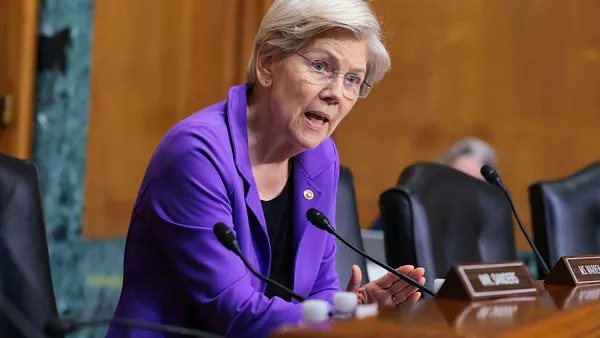Dive Brief:
- Margaret Keane, who has served as CEO of credit-card issuer Synchrony Financial since 2011, will resign effective April 1 and become executive chair of Synchrony's board of directors, the company said Tuesday in a release.
- Brian Doubles, who was named Synchrony's president in 2019, will add CEO to his title and will join the company's board.
- "With Synchrony in a position of strength, now is the right time to begin this planned leadership transition," Keane said in the release. "Brian has helped build this company every step of the way and is the natural successor to advance our progress and lead Synchrony through the next stage of our journey."
Dive Insight:
Keane's roots with Synchrony stretch far past her 10-year stint as CEO. She served as chief executive of Synchrony's predecessor, GE Capital Retail Finance, from 2004 to 2011 and guided the company through its rebranding, a 2014 initial public offering and its 2015 spinoff from GE.
Her exit from managing day-to-day operations at Synchrony means the S&P 500 will lose one of its 30 female CEOs, Forbes reported.
"The positive is I'm still going to be executive chair. And there's not a lot of women in the Fortune 500 who are in an executive chair role," Keane told the publication Tuesday, adding that advancing women into corporate leadership is "something we all have to continue to pay attention to, and we've got to make sure we're developing the talent to have those folks ready for the big roles."
Before Keane steps down, Jane Fraser will ascend to the CEO role at Citi, becoming the first woman to lead a global, U.S.-based bank.
People first
Under Keane's leadership, Synchrony shares have gained roughly 60%, CNBC reported, and the company has expanded its footprint in healthcare — through financing with Care Credit, pet healthcare with the acquisition of insurance company Pets Best, and, on Wednesday, through a newly announced partnership with Walgreens on credit and prepaid debit cards set to debut in the second half of 2021.
But Keane said she may be proudest of the culture she's fostered. "Everyone thinks of it as a soft thing, 'cultures, value, purpose,'" she told Forbes. But values formed a "north star" of sorts that Keane said "helped us as a company work through what has been probably the most challenging year I've ever experienced in my career."
Synchrony said in October it would allow all of its U.S. employees to work from home permanently. The company also gave bonuses to call-center employees and set up a $1.5 million emergency fund for workers with COVID-related medical costs, Forbes reported.
"I think it became even clearer with the pandemic that your employees are who makes the company," Keane said.
Before starting at GE Capital in 1996, Keane held several positions at Citi over 16 years.
Like Keane, Doubles is a homegrown talent. Prior to being named Synchrony's president in 2019, he had served as CFO since 2009, in the company's GE days, according to his LinkedIn profile.
Digital push
Synchrony, the U.S.'s largest provider of private-label credit cards, relies on partnerships with retailers such as Gap, Amazon and Lowe's for a good chunk of its revenue. Despite the toll the coronavirus pandemic has taken on the retail space, Synchrony continued creating new business in 2020, launching a consumer credit card with Verizon. A Venmo-partnered credit card announced in late 2019, featuring a QR code on its face, is set to roll out gradually this year, American Banker reported.
The company in October also extended its partnership with Sam's Club despite a turbulent relationship with the retailer's parent, Walmart. Walmart sued Synchrony for $800 million in damages in November 2018, four months after it agreed to partner with Capital One on new cards. Walmart alleged that Synchrony underwrote the $8 billion portfolio in a way that exposed the program to significant credit risk, American Banker reported. Synchrony, in turn, accused the retailer of promoting the program insufficiently. Walmart eventually dropped the suit.
The pandemic is pushing Synchrony to rely more heavily on digital avenues to add and retain customers. About 60% of Synchrony credit-card applications come through online and mobile channels, up from about 50% before the pandemic, according to the company. The digital push, Doubles said, is a challenge Synchrony is ready to face.
"We've reprioritized our card initiatives around how consumer behavior has changed," Doubles told American Banker, adding that the company is developing its own installment lending business amid the growing popularity of buy-now-pay-later financing. "Consumers want financing options to be transparent and visible throughout the shopping journey, and we're providing all those options, including ways for retailers to keep a connection to the customer for repeat purchases."
Synchrony is also helping customers of its smaller retail partners add digital account access and features through its previously developed application programming interface-powered SyPI tool, Doubles said.
The Consumer Financial Protection Bureau (CFPB) last month also agreed to give Synchrony a three-year safe harbor to develop a secured credit card for consumers with a limited or damaged credit history. After 12 months, under the program, users could opt to transition the card to unsecured credit.
In its release Tuesday, Synchrony also announced its current board chairman, Robert Hartnack, would retire, and Jeffrey Naylor, who has served on the board since 2014, would become lead independent director.












